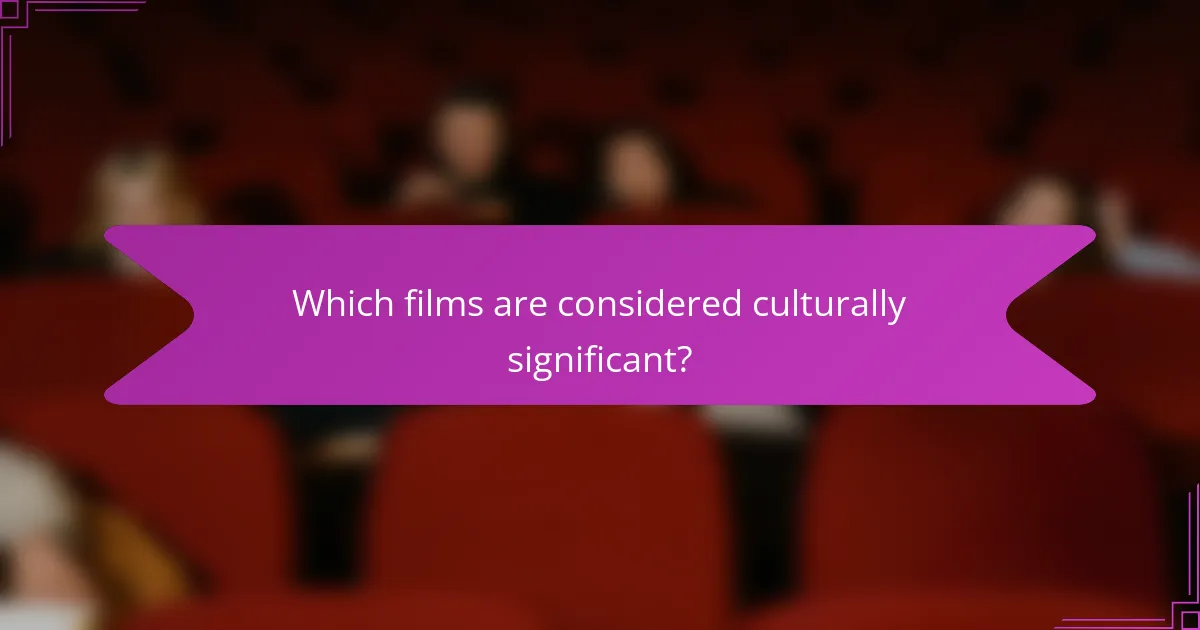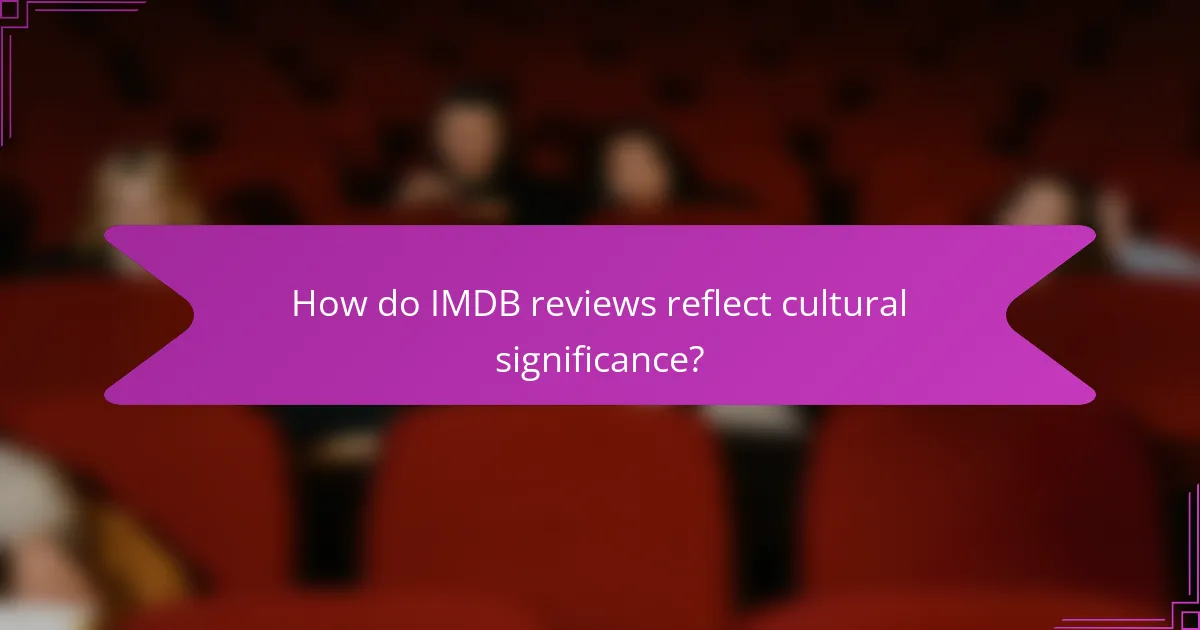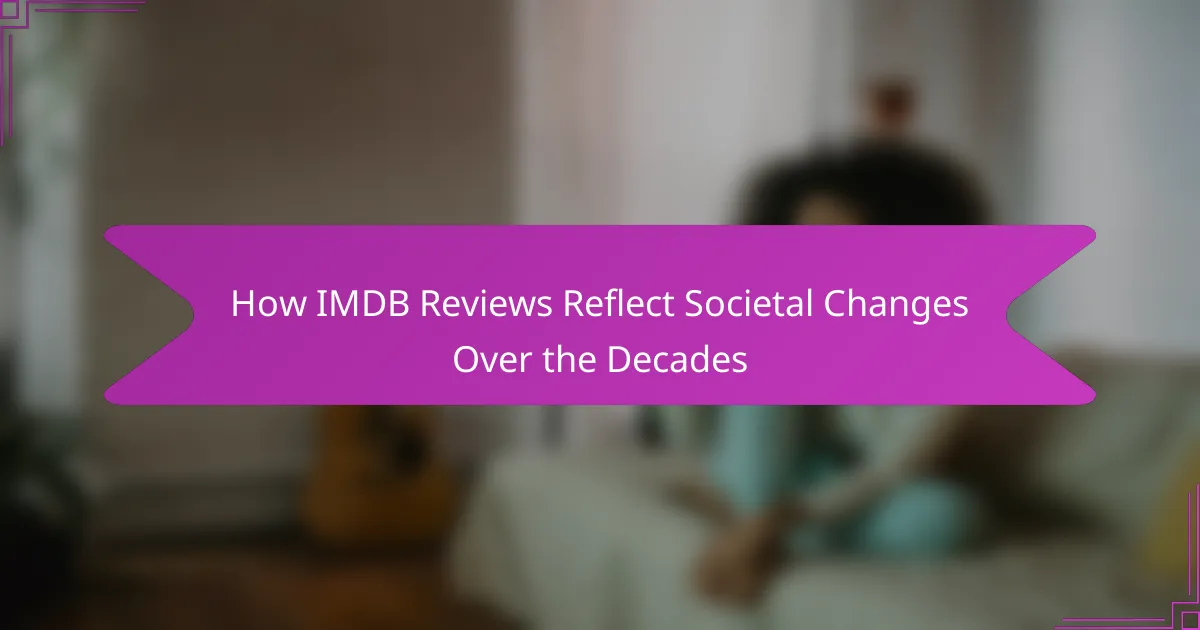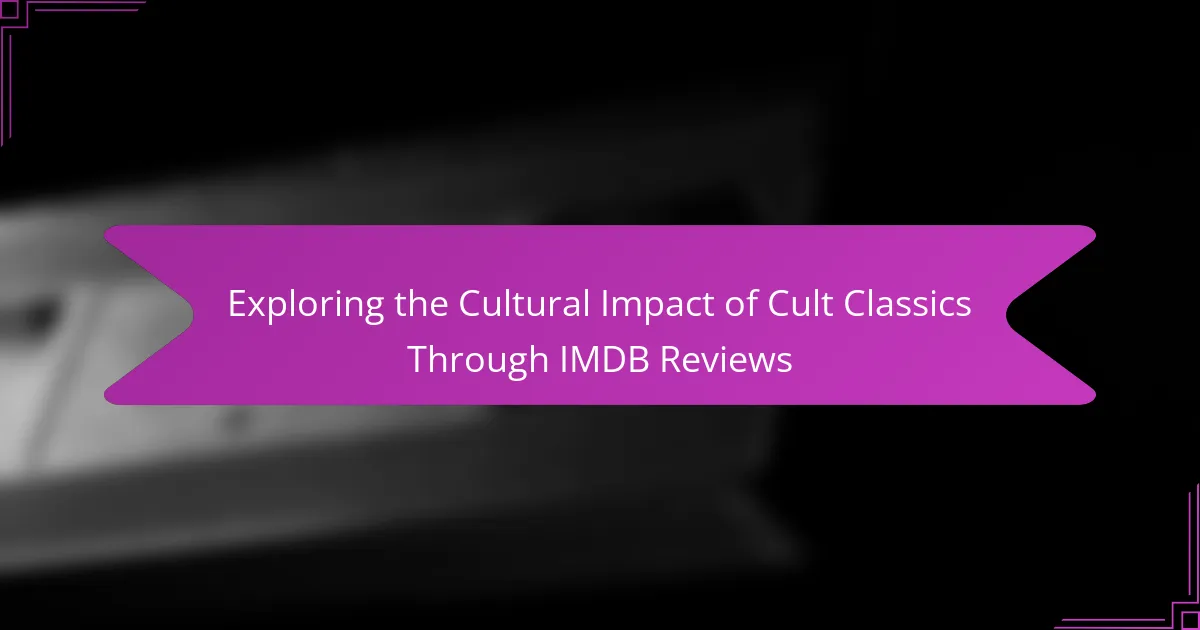Exploring the best IMDB movie reviews that highlight culturally significant films reveals how these works reflect and shape societal values and narratives. These reviews provide valuable insights into the impact of films on audiences, emphasizing their relevance in ongoing cultural discussions and their ability to resonate across generations.

What are the best IMDB movie reviews highlighting culturally significant films?
The best IMDB movie reviews that highlight culturally significant films provide insights into how these movies reflect societal values, historical contexts, and cultural narratives. They often emphasize the impact these films have on audiences and their relevance in contemporary discussions.
Top-rated films with cultural impact
Films like “Schindler’s List,” “12 Years a Slave,” and “Black Panther” are frequently cited for their cultural significance. These movies not only tell compelling stories but also address critical social issues such as racism, genocide, and identity. Their high ratings on IMDB reflect both critical acclaim and audience appreciation.
Other notable films include “The Godfather,” which explores themes of power and family, and “Pulp Fiction,” known for its innovative storytelling. Each of these films has left a lasting mark on cinema and culture, making them essential viewing for anyone interested in the medium’s impact.
Reviews from notable critics
Critics often highlight the cultural significance of films in their reviews, providing context and analysis that enhances viewer understanding. For instance, Roger Ebert praised “Do the Right Thing” for its unflinching portrayal of racial tensions in America. Such reviews can guide audiences in recognizing the deeper meanings behind the narratives.
Notable publications like The New York Times and Variety frequently publish reviews that dissect the cultural implications of films. These critiques help audiences appreciate the artistry and social commentary embedded within the stories, encouraging a more thoughtful viewing experience.
Audience reception and ratings
Audience reception on platforms like IMDB often mirrors critical reviews, with many culturally significant films achieving high ratings. For example, “Parasite” received widespread acclaim for its commentary on class disparity, reflected in its impressive audience score. This alignment between critic and audience ratings underscores the films’ relevance.
Engagement metrics, such as user reviews and discussion threads, reveal how viewers connect with these films on a personal level. Understanding audience sentiment can provide valuable insights into the cultural impact of a film, making it easier to identify which movies resonate most strongly with contemporary viewers.

Which films are considered culturally significant?
Culturally significant films are those that have a profound impact on society, reflecting or shaping social values, norms, and issues. These films often resonate across generations, influencing public perception and dialogue on critical topics.
Films that shaped societal views
Films like “To Kill a Mockingbird” and “Schindler’s List” have played pivotal roles in shaping societal views on race and human rights. They provoke thought and discussion, often leading to greater awareness and understanding of complex social issues.
Additionally, movies such as “The Graduate” and “Boys Don’t Cry” challenge traditional norms regarding gender and sexuality, encouraging audiences to rethink their perspectives. These films often serve as catalysts for change, prompting audiences to engage with pressing societal questions.
Influential directors and their works
Directors like Martin Scorsese and Spike Lee have created films that not only entertain but also provoke critical thought about cultural identity and social justice. Scorsese’s “Taxi Driver” explores themes of alienation, while Lee’s “Do the Right Thing” addresses racial tensions in America.
Other notable directors include Hayao Miyazaki, whose animated films like “Spirited Away” highlight environmental issues and cultural heritage, and Ava DuVernay, whose work in “Selma” emphasizes the importance of civil rights history. Each of these filmmakers uses their platform to comment on and influence cultural narratives.

How do IMDB reviews reflect cultural significance?
IMDB reviews serve as a lens through which cultural significance can be assessed, showcasing audience reactions and societal values. These user-generated critiques highlight themes, representation, and the impact of films on various communities, offering insights into cultural narratives and shifts.
Analysis of user-generated content
User-generated content on IMDB provides a diverse range of perspectives, reflecting the cultural significance of films from multiple viewpoints. Reviews often discuss themes such as identity, social issues, and historical context, allowing audiences to connect personal experiences with broader cultural narratives.
For example, a film addressing racial injustice may receive reviews that emphasize its relevance to current societal debates, showcasing how the film resonates with viewers’ lived experiences. This interaction between the film and its audience can reveal shifting cultural values and priorities.
Trends in film criticism
Film criticism on IMDB has evolved, with a noticeable shift towards inclusivity and representation. Critics and audiences alike are increasingly recognizing the importance of diverse voices in storytelling, which influences how films are received and discussed. This trend highlights the growing demand for films that reflect a wide array of cultural experiences.
Moreover, the rise of online platforms has democratized film criticism, allowing more individuals to share their insights. This shift has led to a richer dialogue around films, where cultural significance is not only evaluated by traditional critics but also by everyday viewers, creating a more comprehensive understanding of a film’s impact.

What criteria define a culturally significant film?
Culturally significant films are those that resonate deeply with societal values, reflect historical contexts, and influence public discourse. These films often address critical themes such as identity, social justice, and human experience, making them pivotal in shaping cultural narratives.
Historical context and relevance
Historical context plays a crucial role in defining a culturally significant film. These films often emerge during pivotal moments in society, reflecting the sentiments and challenges of their time. For instance, films produced during the civil rights movement in the United States often highlight struggles for equality and justice, making them relevant to contemporary discussions about race and social justice.
Additionally, the relevance of a film can be assessed by its ability to provoke thought and discussion long after its release. Classic films like “Schindler’s List” or “12 Years a Slave” continue to be studied and referenced in discussions about morality and human rights, showcasing their enduring impact.
Impact on social movements
Culturally significant films often serve as catalysts for social movements, inspiring audiences to take action. For example, “Milk,” which chronicles the life of [censured] activist Harvey Milk, not only educates viewers about the struggles faced by the community but also galvanizes support for [censured] rights. Such films can mobilize public sentiment and encourage activism.
Moreover, these films can shape public perception and policy. Documentaries like “An Inconvenient Truth” have raised awareness about climate change, influencing environmental policies and encouraging grassroots movements. The ability of a film to spark dialogue and motivate change is a key indicator of its cultural significance.

How to find culturally significant films on IMDB?
To find culturally significant films on IMDB, utilize their advanced search tools and filter options. These features allow you to explore films that have had a notable impact on society, culture, or history.
Using IMDB’s advanced search features
IMDB’s advanced search allows you to narrow down your film choices based on various criteria, such as release date, user ratings, and keywords. To access this, go to the IMDB homepage and click on the “Advanced Search” link, where you can specify your parameters.
For culturally significant films, consider searching for keywords related to social movements, historical events, or influential directors. This targeted approach can help you discover films that resonate with cultural themes.
Filtering by genre and themes
Filtering by genre can help you find culturally significant films that align with specific themes, such as drama, documentary, or foreign films. Each genre often contains films that reflect societal issues or cultural narratives.
Additionally, use IMDB’s thematic filters to explore categories like “Social Issues” or “Historical.” This can lead you to films that not only entertain but also provoke thought and discussion about important topics.

What are the emerging trends in film reviews?
Emerging trends in film reviews reflect changing audience dynamics and the growing impact of digital platforms. As viewers increasingly seek authentic voices and diverse perspectives, traditional review formats are evolving to meet these demands.
Shifts in audience preferences
Audience preferences are shifting towards more inclusive and relatable content. Viewers now favor reviews that highlight cultural significance and personal experiences over purely technical critiques. This trend encourages reviewers to connect films with broader social themes and issues.
For instance, films that address topics like identity, representation, and social justice are gaining traction. Reviewers who emphasize these aspects often resonate more with audiences, leading to higher engagement and discussion.
Influence of social media on reviews
Social media platforms are reshaping how film reviews are shared and consumed. Users often turn to platforms like Twitter, Instagram, and TikTok for quick takes and visual content, which can influence public perception rapidly. This shift allows for immediate feedback and interaction between audiences and critics.
Moreover, social media enables diverse voices to emerge, often challenging traditional critics. Reviews that go viral can significantly impact a film’s success, making it crucial for filmmakers and marketers to engage with these platforms actively.

How can culturally significant films influence future cinema?
Culturally significant films shape future cinema by setting trends, inspiring new storytelling techniques, and addressing social issues. They often serve as a reference point for filmmakers, influencing themes, styles, and audience expectations.
Inspiration for new filmmakers
Culturally significant films provide a wealth of inspiration for emerging filmmakers. By studying these works, new directors can learn about innovative techniques, narrative structures, and character development that resonate with audiences. For instance, films like “Pulp Fiction” have inspired countless indie filmmakers to experiment with non-linear storytelling.
Additionally, these films often highlight underrepresented voices and stories, encouraging new filmmakers to explore diverse perspectives. This can lead to a richer cinematic landscape that reflects a broader range of human experiences.
Revival of classic themes in modern films
Modern films frequently revisit classic themes from culturally significant works, creating a dialogue between past and present. Themes such as love, sacrifice, and social justice are timeless and can be reinterpreted to address contemporary issues. For example, recent adaptations of Shakespearean plays have brought age-old narratives to modern audiences while maintaining their core messages.
This revival not only honors the original works but also allows filmmakers to engage with current societal challenges, making these themes relevant again. By blending classic elements with modern storytelling techniques, filmmakers can create compelling narratives that resonate with today’s viewers.



